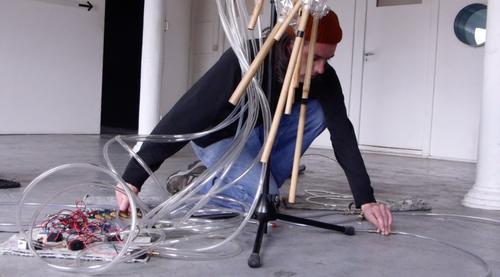
Sholto Dobie residency report
Sholto Dobie creates instruments with analogue technologies which draw on the functions and designs of folk and traditional wind instruments, such as bagpipes and organs. Their appearance several thousand years ago represent a technological shift in music, as humans extended the reach of their lungs, by creating bellows, bags and reservoirs that could sustain flutes and reeds more easily and for longer than human lungs. It is a drive that is echoed in more recent technological socio-musical shifts, such as electronic dance music. Dobie incorporates analogue electronics alongside handmade reed pipes, using basic prefabricated timer modules and industrial electric valves, to control air flow.
Sholto Dobie was born in Edinburgh and lives in Vilnius. He is an artist and organizer working with sound in it's broadest sense. He regularly performs in events, using loose structures, site specific methodologies and an array of sound sources including home-made organs and bagpipes. Over the years, he has explored ideas related to folklore, environment a sonic phenomenon. He is based in Vilnius where he co-organises the artist run space Studium P and curates a regular event and radio series for local and international experimental music called Progine.
He has recorded and performed with artists and musicians including Rie Nakajima, Judith Hamann, Lia Mazzari, Shakeeb Abu Hamdan, Ahti & Ahti, Antonina Nowacka, Malvern Brume, Lucia Nimcova and in the group Lo Escucho Lo Pinto. He has released solo and collaborative music with labels such as Mappa, All Night Flight, Kashual Plastik, Infant Tree, Takuroku, Penultimate Press and Thanet Tape Centre. He has toured widely, presenting performances at Cafe Oto (London), Fylkingen (Stockholm), De Player (Rotterdam), KM28 (Berlin), Kraak Festival (Antwerp), Organ Sound Art Festival (Copenhagen), Jauna Muzika Festival (Vilnius), Counterflows Festival (Glasgow) and most recently in Vietnam as part of the Counterflows / Len Ngan project Thanh Canh.